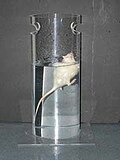Behavioural despair test
Behavioural Despair Test is a widely used experimental method in Behavioural Neuroscience and Psychopharmacology to evaluate Antidepressant drugs or to induce a depressive-like state in animals, typically rodents. The test is based on the observation that a rodent placed in a container filled with water will initially attempt to escape, but will eventually exhibit immobility, which is interpreted as a measure of behavioural despair.
History
The Behavioural Despair Test, also known as the Forced Swim Test (FST) or the Porsolt Swim Test, was first developed by Roger D. Porsolt and his colleagues in the 1970s. The test was designed to model a depressive-like state in rodents to facilitate the development of antidepressant drugs.
Procedure
The test is conducted over two days. On the first day, the rodent is placed in a cylinder filled with water from which it cannot escape, and the duration of immobility is recorded. On the second day, the rodent is placed back into the cylinder, and the duration of immobility is again recorded. The increase in immobility time from the first to the second day is interpreted as behavioural despair.
Interpretation
The Behavioural Despair Test is based on the assumption that the rodent's immobility reflects a state of despair, in which the animal has given up the attempt to escape from the stressful situation. This is considered to be a model of depression, and is sensitive to antidepressant treatment. However, the interpretation of the test has been a subject of controversy, with some researchers arguing that the immobility does not reflect a depressive-like state, but rather a learned adaptive strategy to conserve energy.
Criticism
The Behavioural Despair Test has been criticized on both ethical and scientific grounds. Ethically, the test has been criticized for causing unnecessary stress and suffering to the animals. Scientifically, the test has been criticized for its lack of specificity and sensitivity, and for the fact that it does not model the complexity of human depression.
See also
References
Behavioural_despair_test
Transform your life with W8MD's budget GLP-1 injections from $125.
W8MD offers a medical weight loss program to lose weight in Philadelphia. Our physician-supervised medical weight loss provides:
- Most insurances accepted or discounted self-pay rates. We will obtain insurance prior authorizations if needed.
- Generic GLP1 weight loss injections from $125 for the starting dose.
- Also offer prescription weight loss medications including Phentermine, Qsymia, Diethylpropion, Contrave etc.
NYC weight loss doctor appointments
Start your NYC weight loss journey today at our NYC medical weight loss and Philadelphia medical weight loss clinics.
- Call 718-946-5500 to lose weight in NYC or for medical weight loss in Philadelphia 215-676-2334.
- Tags:NYC medical weight loss, Philadelphia lose weight Zepbound NYC, Budget GLP1 weight loss injections, Wegovy Philadelphia, Wegovy NYC, Philadelphia medical weight loss, Brookly weight loss and Wegovy NYC
|
WikiMD's Wellness Encyclopedia |
| Let Food Be Thy Medicine Medicine Thy Food - Hippocrates |
Medical Disclaimer: WikiMD is not a substitute for professional medical advice. The information on WikiMD is provided as an information resource only, may be incorrect, outdated or misleading, and is not to be used or relied on for any diagnostic or treatment purposes. Please consult your health care provider before making any healthcare decisions or for guidance about a specific medical condition. WikiMD expressly disclaims responsibility, and shall have no liability, for any damages, loss, injury, or liability whatsoever suffered as a result of your reliance on the information contained in this site. By visiting this site you agree to the foregoing terms and conditions, which may from time to time be changed or supplemented by WikiMD. If you do not agree to the foregoing terms and conditions, you should not enter or use this site. See full disclaimer.
Credits:Most images are courtesy of Wikimedia commons, and templates, categories Wikipedia, licensed under CC BY SA or similar.
Contributors: Prab R. Tumpati, MD

